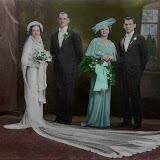A Study by Johann R. Bauernfeind, Munich
Whoever attempts to literally "translate" the Name necessarily comes to the wrong conclusion that our ancestors must have acted hostilely toward the farmers. What is closer to the truth, as this essay suspects, is that the origin (of our Name) dates to the time of the farmer-wars.
In the various Name-Encyclopedias under "B", one simply reads: Paurnfeindt, Pauernfeind, Bauernfeind, Bauemfeind is a principal-name [Obername] for a knight and also robber-barons.
The first designation [i.e. a knight] deals specifically with our ancestors, for the first to bear our name was Friedrich Pauernfeind der Kemnater [of Kemnat]. As the fief-holder of the former Castle Rosenberg [Rose-mountain. This castle is E-SE of Regensburg] he surely belonged to the fighting nobility. His name was given to our entire House. Considerating the fact that his father Heinrich Kemnater and these brothers Conrad and Johann Kemnater stood in the service of the German emperor and Bohemian king Charles IV (in Bohemia Charles I) who had enacted in the 13th century a so-called land-peace-law [Landfriedensgesetz] against the Robber-barons [Raubritterei], it can be said that our House was not one of these Robber-barons [Raubrittereil].
So the question is raised: Why did some knights call themselves Pauemfeind?
The answer is probably found in the social climate of the time. A large part of the lesser nobility were originally like the unfree (serfed) farmers, however they climbed their way up as nobility who derived their titles from being in the king's service [Dienst-adel] in the military [Waffen-] and civil service [Beamtendienst]--thus they became eneoffed [lehensfähig]. So they lived like many of the old nobility whose Houses descended from their castles, building the first line in the defense, which initially, at most, were very meager defenses. Sometimes it might have been that a powerful farmer lived securely on his farm just as a member of the lesser nobility lived in his castle. With the crusade-call of Pope Urban II in 1095 to Clermont a continuous number of crusaders were made knights, often the local nobility [Ortsadel] from the surrounding area knew exactly how many descended only from that member. On their way to Jerusalem the crusaders came into contact with foreign cultures and upon their return home they brought back unfamiliar goods and customs, which had the consequence: that one who spoke as a man of world was thought of by the native population during his lifetime and even generations later to still be called Bauern-Feind [farmers' enemy], i.e. not a farmer.
At the time when knighthood [Rittertusm] was declining some members of the knighthood sustained themselves through Robber-barony [Raubritterei]. It became common to generalize the enemy [der Gegner] as acting in this manner, and so the public assumed that all the knights (and the name Bauemfeind) conducted this evil activity.
Comment: As research on the family was ascertained, originally there were different members of noble families called "Pauemfeind". In the most instances only a single person had this over-name [Übernamen], which did not pass onto his descendants. Today there are at least three families living with a similar name, as well as a Bauemfeind; others in the family's ancestry can be verified either through the church register or through Heraldry.
Christ, Thor and the Midgard Serpent, para. 2
6 years ago



1 comment:
Pretty good post. I just stumbled upon your blog and wanted to say that I have really enjoyed reading your blog posts. Any way I’ll be subscribing to your feed and I hope you post again soon.I want you can to see,at
http://www.northface-buy.org
http://www.northfaceshop.org
Post a Comment